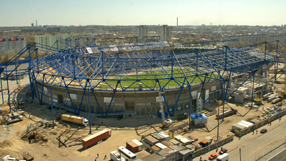
The best features, fun and footballing quizzes, straight to your inbox every week.
You are now subscribed
Your newsletter sign-up was successful
Want to add more newsletters?

Five times a week
FourFourTwo Daily
Fantastic football content straight to your inbox! From the latest transfer news, quizzes, videos, features and interviews with the biggest names in the game, plus lots more.

Once a week
...And it’s LIVE!
Sign up to our FREE live football newsletter, tracking all of the biggest games available to watch on the device of your choice. Never miss a kick-off!
Join the club
Get full access to premium articles, exclusive features and a growing list of member rewards.
UEFA's executive committee heard a report from Martin Kallen, project director of the 16-team tournament being staged in Poland and Ukraine in just over two years' time, in which he outlined problems at the stadiums in Kiev and Lviv in Ukraine.
Gianni Infantino, UEFA's general secretary told Reuters afterwards: "We are concerned, yes, the problems are serious. However we have every faith that they will be sorted out. It is time now for Ukraine to get into a higher gear.
"We are sure everything will be ready in time but are closely watching the situation."
Earlier, UEFA spokesman Rob Faulkner told a news briefing: "There had been some concerns, particularly in Ukraine, about possible delays leading to questions (over) whether two of the host cities were behind schedule.
"Kiev in particular was one of the cities that was under discussion. The technicalities involve the roof and some other building technicalities but we don't have any concerns that they won't be ready in time."
Ukraine's new president, Viktor Yanukovich, ordered a big push on the building work.
"I understand very well that we today are lagging behind the timetable on preparation and thus we must undertake unusual measures to raise the building of stadiums, roads, hotels and in general of the whole infrastructure," Yanukovich said in comments on his website.
The best features, fun and footballing quizzes, straight to your inbox every week.
SLOW WORK
Yanukovich, who met Deputy Prime Minister Borys Kolesnikov on Wednesday, was quoted as telling him: "There is a lot of talk about us financing Euro 2012 out of the state budget."
"I would like you to propose an investment programme and find the means of attracting credit for financing this very important state event."
Kolesnikov said the necessary work would be done.
"In its 19 years of independence, Ukraine has not built a single new airport or stadium. The president has given me a full-scale task - to build three airports and two new stadiums in one and a half years. But we will build them," he was quoted as saying on the president's website.
Analysts say slow work on Euro 2012 building reflects the harsh impact of the global downturn on the ex-Soviet republic, pushing it close to financial default.
Political infighting in the previous governing administration and intense rivalry among business groups has also hindered work.
Kallen said in an interview with Reuters that the tournament's matches could be staged in six venues if necessary although UEFA was not considering this at the moment and was still planning for eight venues.
UEFA president Michel Platini has steadfastly backed the decision to host Euro 2012 in eastern Europe and will not allow further delays to detract him from announcing that he will seek another term as UEFA president at Thursday's congress.
With no opposition to a renewed mandate, Platini looks set to get backing from all 53 member associations ahead of the elections in a year's time.
Follow FFT.com on
 Join The Club
Join The Club










